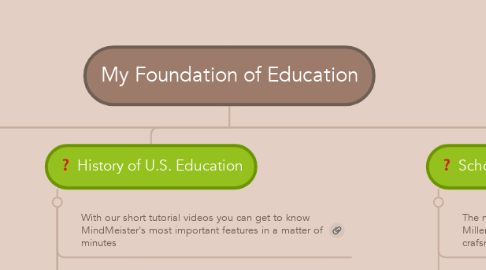
1. Schools as Organizations
1.1. The nature of teaching. Accordig to Miller teachers are viewed as crafsman.
1.2. Underqualified teachers A requirement of NCLB all schools must have highly qualified teachers.
1.2.1. School Process and School Culture Waller stated schools are seperate social organizations.
1.2.1.1. Schools are seperate organizations because they have a definite population, a clearly defined political structure, represent the nexus of a compact network of social relationships
1.2.1.1.1. Governance States retained their authority and responcibility for education because the federal government made no claims concerning its authority.
2. Philosophy of Education
2.1. Download our native mobile apps for iOS and Android to mind map on the go!
2.2. Philosophy of education is rooted in practice where philosophy itself has no particular end in mind.
2.3. Pragmitism derived from Greek word Pragma meaning work.
2.4. American pragmatist George Sanders Peirce, William James, and John Dewey. European early philosophers that could be labeld as Pragmists Frances Bacon, John Locke, and Jean-Jacques Rousseau.
2.5. Pragmitism is a philosophy that encourages people to find processes that work in order to achieve their desired goals.
2.6. John Dewey introduced the terms instumentalism and experimentalism refereing to the pragmatic relationship between school and society andexperimentalism refers to the pragmatic approach to the application of educational ideas on an experimental basis. pg 187
2.7. These philosophies lead to progressive education. Progressive education presents different approaches to learning.
2.8. The role of a teacher in a progressive setting is no longer authoritorian. The teacher becomes the facilitator or learning by encouraging, offering suggestions, questions, and helps plan and implement the course of study. p. 189
3. History of U.S. Education
3.1. With our short tutorial videos you can get to know MindMeister's most important features in a matter of minutes
3.2. 1820 movement or education of women was underway.
3.3. In 1868 Freedman's Bureau helped establish Black Colleges
3.4. 1893 Education for All proposed five model curricula classical and modern lannguage, English, mathematics, history, and science
3.5. 1954 Brown v/s The Topeka Board of Education rules segregation in schools unconstitutional
3.6. 1983 The National Commission for Excellence in Education headed by U.S. Secretary of Education Terrel Bell releases a Nation at Risk that argues U.S. education is mediocre results in the beginning of education excellence.
3.7. 2002 President Bush signs in No Child Left Behind
4. Politics of Education
4.1. Visit the MindMeister Academy to learn all the tricks and become a great mapper in no time!
4.2. Conservative
4.2.1. Values
4.2.1.1. Self motivation
4.2.1.1.1. Traditional
5. Sociological Perspectives
5.1. To view the most important shortcuts, click on the question mark in the bottom right corner of your map editor, then click "Key Shortcuts"
5.2. Functional Theories
5.3. Emile Durkheim invented sociology of education in the late 19th century.
5.4. Functionist point of view on educational reform promotes structures, programs and curricula that are technically advanced, rational, and support social unity.
5.5. Gaduating from college leads to greter employment opportunities.
5.6. Rosenthal and Jacobson found in a study that teacher expectations directly influenced student achievement.
5.7. Ray Rist believes that labeling students is a self fulfilling prophecy. pg. 153
6. Curriculum and Pedagogy
6.1. Transformatives I follow Dewey and Plato
6.2. Major Stakeholders in Our State's Education Steve Livingston Senator Ritchie Whorton House of Rep. State Superintendent Thomas Bice Mary Scott Hunter Representitive on State School Board to District 8 Local Superintendent Kenneth Harding
6.3. My choice of pedagogic practice Transformative
6.3.1. Approach to Curriculum Transformative by providing multidimesional theory of teaching. Believer of teching and learning being inextracably linked.
6.4. The educational I theory is transformative.
6.4.1. Jackson distinguished between two dominant traditions of teaching mimetic and transormative.
